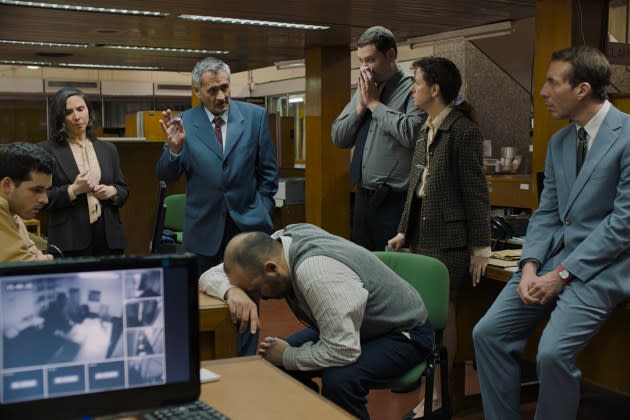‘The Delinquents’ is a Heist Movie That Demands You Quit Your Job ASAP
- Oops!Something went wrong.Please try again later.

Heist movies tend to operate by a narrative rule of three: You show the preparation; you detail the execution, bit by painstaking bit; and you map out how the criminals and/or their crew get away with it, or don’t. The Delinquents, Argentine writer-director Rodrigo Moreno’s left-of-center contribution to the genre, dispenses with the first part entirely, and fast-forwards you right to second base. A bank manager named Morán (Daniel Elías) wakes up in the morning, gets dressed, and leisurely strolls through the streets of downtown Buenos Aires to work. He and another employee go through several gated areas until they get to a vault. Once there, they count out several stacks of cash from the previous day’s take, put some in a metal box to take upstairs — just petty cash, mind you — and put the rest in a safe. It’s a two-man job, designed for maximum checks-and-balances security.
Throughout the afternoon, Morán goes about his day. He waits patiently until a coworker, Román (Esteban Bigliardi), goes to talk to their boss; this teller is wearing a neck brace, and he has to leave early to get it removed. Can they get someone to fill his shift for the rest of the day? The same man who helped Morán earlier takes the other man’s seat, Román goes to his doctor, and the manager surreptitiously puts a backpack inside the metal box. Because his partner is stuck in the front helping customers, he goes downstairs to make a deposit solo. Once Morán’s in the vault, he fills the backpack full of cash. Oddly, he doesn’t seem perturbed by the presence of a surveillance camera. Then the manager exits the building, with his loot procured.
More from Rolling Stone
The fact that this last bit happens to a jazzy, Lalo Schifrin-esque score suggests Moreno’s movie is about to go into full-on thriller mode, but the filmmaker isn’t interested in leading viewers through The Fugitive Redux. That evening, Morán and Román meet up. The former has a duffel bag at his feet and a proposal on his mind: He wants the young man to take the $650,000 he’s just stolen and look after it for three and a half years. Morán has calculated that if he turns himself in, he’ll likely receive a six-year sentence, but will be out in a little over half that time with good behavior. Refuse the offer, and he’ll lie and say Román was his accomplice. Say yes, and the two men can split the money in half once he’s served his time.
Why does he only want $325,000, you ask? Because if Morán stayed at the bank until he retired — about another 25 years, he reasons — that’s the same amount he would have made. He’d just be too old to enjoy the time he has left. The way he sees it, three and half years in the clink versus a wasted life, but with the exact same pot of gold at the end of the rainbow, isn’t a bad trade-off. When you think about it, his crime is really just a down payment on his freedom from two-plus decades of 9-to-5 tyranny.
From here, Moreno spends the rest of The Delinquents‘ three-hour running time playfully winding his way through any number of different genres, all in service to a narrative that keeps cracking itself open and revealing layers like a Russian doll. When a detective (Laura Paredes) starts grilling employees about their knowledge of the crime, the movie becomes a workplace farce and a parody of a cop procedural, with Kafka and some late-stage capitalism blues thrown in for good measure. A prison drama takes a turn toward the Borgesian once you realize that a jailhouse bigwig making life hell for Morán is played by the same actor cast as his boss at the bank (kudos to you, Germán De Silva).
Then things reset at the halfway point, with Román now ambling through the countryside with a random trio of twentysomethings, including a free spirit named Norma (Margarita Molfino); we later find out these three have a deeper connection to the story then you might have guessed. Digressions on kids’ lullabies and a game involving the names of cities take up an inordinate amount of real estate. An album by the semi-obscure Seventies Argentine band Pappo’s Blues keeps popping up as an objet d’art and a recurring motif. (If nothing else, this film should have everyone immediately putting this insanely hard-rocking collection of songs on repeat for the next few weeks.) Moviegoing and moviemaking are both used as transitional elements within the plot(s), even as the movie you’re watching seems to be slowly coming apart at the seams.
It is, and it isn’t. Moreno is indeed a trickster, fond of wordplay (take another look at the characters’ names) and visual gags and gently nudging his storylines off the rails into unexpected, uncharted terrain. But he knows exactly what he’s doing, and the looseness and loopiness of it all is really a well-planned modus operandi. Part of the sheer joy of watching The Delinquents is not knowing where it’s going next, only to feel that its many tangents and detours were dotted on the path all along. It’s a movie that starts out with a man stealing from his employer, then ride offs into the sunset on the notion that you’re the one’s who been stolen from: your precious time, your sense of worth as something more than a wage-slave, your best years of your life. Better to stop, slow down and ask yourself how you’d really like to spend your days on this planet. And then take a second to ask yourself: Who are the actual delinquents in this lazy, hazy, philosophical parable?
Best of Rolling Stone
